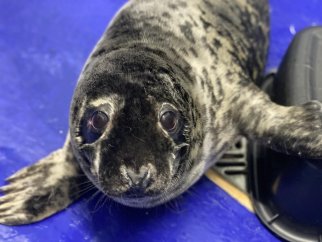
Test For Species-Crossing Avian Flu Helps Cornish Sanctuary Save Seals
Highly Pathogenic Avian Influenza (HPAI) is devastating wild seabird colonies and commercial poultry flocks worldwide. Scavenging on HPAI infected seabird carcasses is blamed for increased avian flu deaths in seal populations.
Now Vetlab Supplies is partnering the Cornish Seal Sanctuary to help avert a potential UK wild seal catastrophe, by supplying Avian Flu Test Kits to screen for AI in rescued and rehabilitated seals.
Background: A New Strain Of Avian Influenza
In the late summer and autumn of 2022, The UK Department for The Environment Food and Rural Affairs (DEFRA), together with the Animal and Plant Health Agency (APHA) reported the appearance of a highly pathogenic strain of the avian influenza virus (HPAI).
Detection and Early Action Key To Preventing Spread Of HPAI
Earlier in the year, The UK Health Security Agency (UKHSA) warned that, although the transmission of bird flu from birds to people is extremely rare, one such transmission was found in a keeper having close contact with a large number of infected birds over a prolonged period.
Also in the summer of 2022, the UK Health Security Agency (UKHSA) published a report by their specialist Human Animals Infection Risk Surveillance Group (HAIRS).
Appearance Of Avian Influenza In UK Seal Populations
Sporadic and incidences of Avian Influenza in UK seals have been reported, including the H3N8 strain from a seal pup in Cornwall in 2017, and the H5N8 strain in grey and common seals at a marine rehabilitation centre on the Norfolk coast in 2020.
The UK is home to 38% of the entire world’s population of grey seals, and 30% of the European subspecies of common seals.
Keeping Wild, Rescued And Rehabilitated Seals Safe From HPAI
In The UK, The Seal Alliance is a collective of regional organisations focused on marine conservation work with seals. Set up by the Seal Protection Action Group with the Disturbance Working Group, members have decades of experience protecting seals.
Seal Alliance member, The UK Cornish Seal Sanctuary said, “Being able to test the new pups coming through our doors through the breeding season is absolutely vital to ensure we’re protecting all of our marine animals here on site, including our resident penguins”.
AI flu testing enables CSS to keep new seal pups isolated until they have an ‘all-clear’, mitigating the risks to seals already resident while continuing to offer help to new pups as they arrive.
Bird Flu Risk To UK Population From Animals Other Than Birds
A HAIRS report for UKHSA evidenced only 2 non-UK incidents of Avian Influenza Virus (AIV) transmission from seals to humans, concluding that any such risk to be ‘very low’, while acknowledging a lack of routine surveillance specifically in marine mammals.
The group also concluded the risk to the UK human population of avian influenza infection from seals to be low, with no cases of bird flu passing from seals to humans reported in the UK.
Lack of Routine Surveillance For AI In Marine Mammals
Although there are well developed testing and surveillance strategies for AI infection in commercial poultry and wild birds, there is no routine surveillance for diseases including AIV specifically in marine mammals.
As part of their work with animal charities, Vetlab Supplies is supporting the Cornish Seal Sanctuary to ensure that their pups and residents are as protected as possible as new rescues come into their care.
Avian Influenza In Seal Populations Worldwide
Although few AI incidents have been reported in UK seals, the situation for seal populations from the coastline of North America and Canada to the North Sea Coast of Germany, is more worrying.
As far back as September 2011, seals with severe pneumonia and skin lesions suddenly appeared on the US coast from southern Maine to northern Massachusetts. Most were less than 6 months old with a total of 162 dead or dying seals recovered over the next 3 months.
In August 2022, researchers in Canada detected avian flu in at least two species of seal. AI is suspected of contributing to the death of around 100 dead harbour seals found since January along the south shore of the St. Lawrence River in eastern Quebec.
The first H5N1 flu cases are believed to have arrived in North America at the end of winter, from birds migrating from Europe.
UK Animal Charities Call for Public Caution and Government Action
The RSPCA, British Trust for Ornithology (BTO) The Wildlife Trusts and Seal Alliance have all warned of the risks to public health from Avian Influenza, and raised a call for government action.
A spokesman for the RSPCA said: “Avian influenza (AI) is primarily a disease of birds, though there have been reports of highly pathogenic AI in seals and foxes, so bird flu can cross into other species.”
Testing and Monitoring: The Key To Finding and Controlling Avian Influenza
Applicable to faecal or cloacal samples from chickens, turkeys, geese, ducks, captive collections and wild bird populations, the Vetlab supplied FASTest AIV Ag is the fast and reliable veterinary-standard complete testing kit.
Suitable as a screening test, and for one-off individual tests, FASTest AIV Ag provides for the fast and simple detection of all Avian Influenza Virus type A subtypes in commercial, domestic and wild birds.
FASTest AIV Ag provides the veterinarian, commercial flock manager, conservationist and recreational bird keeper with on-site confirmation of any clinical suspicion.
Rapid testing and clear results offered by FASTest AIV Ag enables the timely initiation of any mandatory measures to reduce infection within and beyond the tested population, provides peace of mind to keepers and managers, and reduces the risk of cross-species transmission into wildlife and human populations.
For further information on this Diagnostic Test Kit & others visit our website www.vetlabsupplies.co.uk or call 01798 874567

